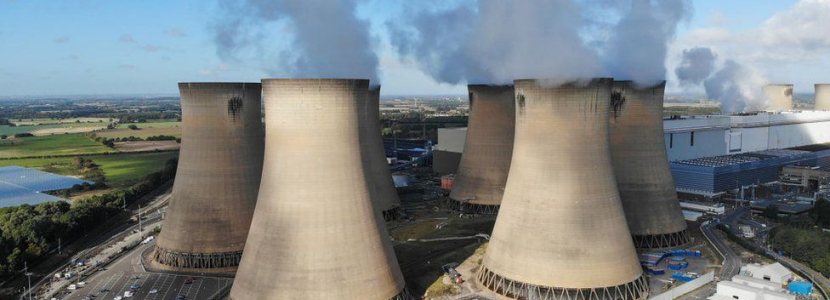
Cutting Carbon, Not Forests
The Ongoing Campaign Against Biomass Subsidies
Since 2005, several British power plants have been converted from coal to biomass, requiring millions of tonnes of imported wood pellets.
This wood chip burning is Britain’s least green energy source, producing more carbon emissions per megawatt hour produced than coal and pollutants such as sulphur dioxide.
However, biomass smokestack emissions are officially credited to the country where the trees are grown, primarily the United States and Canada. This means wood burning is officially considered ‘zero carbon’ in the United Kingdom and attracts large taxpayer subsidies amounting to little more than an ‘accounting trick’.
The wood-burning emissions are meant to be recaptured through tree planting. However, the time it will take for new trees to absorb emissions from the burnt trees is estimated to be between 44 and 104 years. This lag is too slow to help the government’s net zero by 2050 target. The burnt wood chips are also meant to be waste products, but there is evidence that primary forests are being cut down for wood pellets.
Worse is the belief that a single sapling offsets the absorption capability of a fully-grown timber tree. Academics estimate that the carbon payback time for burning wood is 190 years. Mass planting should be looked upon with caution - see the fields of failed saplings alongside motorways across the UK to understand why.
Biomass is expensive compared to wind, solar, gas and nuclear. It also risks becoming even more costly with proposals for further subsidies linked to carbon capture technology. The Department for Energy Security and Net Zero has said carbon capture is ‘unproven at scale’.
The experiment started in 2004 with 50,000 willow trees all sourced from Yorkshire. Since then, in a classic case of ‘bait-and-switch’ we now burn 27 million trees a year with every single one imported. To give an idea of the scale, the New Forest only contains 46 million trees. The imported trees are being hauled across the Atlantic in polluting ships.
It is basic logic that chopping down trees in the USA, transporting them across the Atlantic by fuel-oil ship and then burning them is going to increase carbon dioxide levels. The data confirms this; over 500 scientists confirm this.
Of still greater concern is that, according to the IPCC, burning trees creates even more CO2 emissions than burning coal.
Yet despite this harm, UK consumers have been forced to pay £6 billion in renewable subsidies.
The Sunday Times have called the subsidies a “tree-burning racket”.
Then Energy Secretary, Kwasi Kwarteng, told MPs that burning imported trees “does not make any sense” and that his department was close to deciding that it “doesn’t help carbon emission reduction and so we should end it.”
Senior journalists from BBC Panorama, The Telegraph and CBS News have reported how entire forests are being cleared to feed the UK’s demand for burning wood.
The Telegraph says it calls for the equivalent of 120 million trees a year to be consumed.
505 scientists have stated that burning forests for electricity was creating a huge carbon debt.
The energy regulator, Ofgem, has commissioned yet another investigation into power company Drax's spurious claims of sustainability.
The Guardian has identified “growing scepticism over its green credentials”.
Sky News has further revealed that Drax had been told by its own advisers to stop claiming that burning trees is “carbon neutral”.
The experiment must end. We should leave trees in the ground. Or lock the carbon in furniture - or, in the case of willow, cricket bats. There must be no further subsidies for burning trees in our power stations beyond the current 2027 contracts. It is undermining public confidence in the push towards Net Zero.
Generating electricity from burning trees is no better than burning coal in terms of emissions; continuing subsidies for wood biomass is actively contributing to the climate crisis that is leaving a planet devoid of life and greenery for future generations to deal with.
The Government should reconsider its current position.










